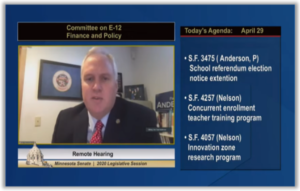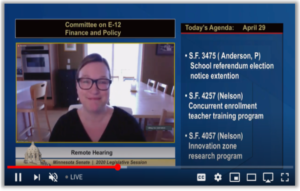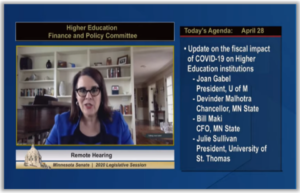Dear Friends,
Over the past seven weeks, our lives have been disrupted in major ways.
There is not one community in our state that hasn’t been impacted – everyone has been impacted and it has been challenging for nearly every aspect of our daily life.
Heroes new and old have emerged during this crisis – first responders, healthcare workers, grocery workers, janitors, delivery and truck drivers, teachers, and so many more.
My family hopes and prays that you and your family are doing okay and staying safe.
For many, frustrations are rising that we can’t get back to a new normal and fully reopen our economy.
The economic concerns are real, and the fiscal impacts will not only continue to be devastating to those businesses, but also on the budgets of our cities, counties, state and nation for the foreseeable future. We need to continue to reopen as much as we can, in a safe and manageable way and get it right. This is going to require much patience and adjustments to the new normal of wearing masks in public and continuing to abide by social distancing guidelines.
There are also real concerns for the impact this crisis is having on our kids and families. We all want our kids to be safe, healthy and happy.
The inability to go to school, participate in sports and activities, and spend time with their friends, has been a “major bummer and disappointment” to both of our girls. Now, with the reality of summer activities, camps, and trips, that are being canceled, this adds some additional hardships for our kids (and parents too!).
Kids are resilient, but I cannot imagine having missed half of a school year away from my friends, or other activities like a baseball season, prom, or graduation. My heart breaks for our kids, and especially those seniors.
Let’s continue to rally around and support each other – our family and friends, neighbors and loved ones. We will get through this. It’s just going to take some more time and a lot of work from all of us.
Turning to Senate business, we are now just two weeks from the end of the legislative session on May 18 – our constitutional adjournment date.
Although the session has been drastically disrupted by the COVID crisis, there is still important work to be done in these final days.
We continue to primarily be focused on addressing and responding to the coronavirus pandemic. This week the Senate passed an Economic Recovery Act package aimed at helping Minnesota rebound quickly from the economic fallout of the COVID-19 pandemic.
In addition to Committee hearings, discussions with officials from all levels of government, business owners and community leaders, and work on several different pieces of legislation, I also had the opportunity to present my bill, Senate File 3475, during a virtual meeting of the Senate Education committee.
Please take a few minutes to read some of the highlights and updates from the past week.
Senate File 3475
On Wednesday during a virtual informational hearing of the Senate E-12 Finance and Policy Committee, I had the opportunity to present my bill, Senate File 3475. Although no official action was taken on the bill, I am hopeful it will become part of a final education bill at the end of session.
 Under current law, school boards with a referendum on the ballot must send a notice by mail to each taxpayer in the school district informing them of the referendum and the proposed tax increase it entails.
Under current law, school boards with a referendum on the ballot must send a notice by mail to each taxpayer in the school district informing them of the referendum and the proposed tax increase it entails.
The law currently requires the notices be sent at least 15 days but no more than 30 days prior to the election. In recent years, many Minnesotans have been begun taking advantage of early voting opportunities. Consequently, many voters are casting their ballot prior to receiving notice and information on the proposed referendum.
SF 3475 would simply extend the window to no more than 45 days prior to the election to give early voters a chance of being informed of a referendum in their district.
I want to thank Andrea Cuene, Chair of the Wayzata School Board, and Chair of the Association of Metro School Districts who joined me to testify in support of the bill.
Districts who joined me to testify in support of the bill.
SF 3475 enjoys broad support among education leaders including from the Minnesota School Board Association, the Minnesota Association of School Administrators, Schools for Equity in Education, and the Minnesota Rural Education Association.
You can read the full text of the bill here.
Coronavirus Economic Recovery Act
On Thursday, the Senate approved an Economic Recovery Act with strong bipartisan support to help small businesses battling financial hardship caused by the coronavirus and the stay-home order. The $330 million bill emphasizes three elements that will benefit impacted businesses and their workers: liquidity to preserve cash flows, stability to give businesses some level of confidence moving forward, and recovery aid to help them push through the pandemic.
To our small businesses and their employees – we are working to get you through this challenging time and look forward to seeing you back in business again. To our families and students – this is just a step, but we will keep advocating for everyone struck by the economic impact of COVID-19. This bill provides the relief needed for our communities to overcome unanticipated adversity. We will build a stronger future as we come together to restore our economy and our state.
Small businesses struggling with cash flow due to the crisis will be able to keep more money on hand thanks to delayed tax payments for S-corporations, partnerships, and C-corporations; delayed installments of estimated tax payments; delayed accelerated sales tax payments, and delayed general statewide business property tax payments.
More families with children in school will be eligible for the K-12 tax credit, thanks to a higher qualifying income threshold.
Other provisions include:
- A fairer school equalization aid formula, so districts with low property wealth will get more revenue
- An elimination of sunset and continued funding for the Angel Investment Tax Credit
- Charitable gaming tax relief to keep more tax dollars in local communities
- Making federal Paycheck Protection Program loans non-taxable on Minnesota taxes
- A reduced tax rate for low-income qualifying low-income class 4D rental property
Federal and state governments have already authorized extensions of income tax payments, sales and use tax payments, MinnesotaCare and Provider tax payments, and occupation taxes paid by mining companies.
Higher Education
On Tuesday the Senate Higher Education Finance and Policy committee held its first virtual hearing since the COVID-19 crisis began. The informational hearing provided the committee an opportunity to hear from our higher education institutions about the challenges they are facing due to COVID-19, their needs, and what measures they have taken in response.
 Representing the University of Minnesota were President Joan Gabel, and Senior Vice President for Finance and Operations, Brian Burnett. Minnesota State was represented by Chancellor Devinder Malhotra, and Chief Financial Officer Bill Maki. Julie Sullivan, University of St. Thomas President represented the Minnesota private colleges.
Representing the University of Minnesota were President Joan Gabel, and Senior Vice President for Finance and Operations, Brian Burnett. Minnesota State was represented by Chancellor Devinder Malhotra, and Chief Financial Officer Bill Maki. Julie Sullivan, University of St. Thomas President represented the Minnesota private colleges.
Our higher education institutions are in an extremely difficult position due to this crisis. The crisis has exacerbated challenges these institutions were already facing, and like many segments of our society, higher education is facing a lot of uncertainty going forward.
Following our hearing, I joined Shannon Loehrke of Capitol Report for an interview to discuss how higher education institutions in Minnesota are coming to grips with the educational, extra-curricular and financial fallout resulting from the coronavirus pandemic. You can watch the interview by clicking here.
Governor’s Executive Orders
On Thursday, Governor Tim Walz signed Executive Order 20-48.
This extends the stay at home order to May 18 with some modifications. Bars and restaurants will remain closed, but as early as Monday, retail businesses may re-open for curbside pickup and delivery. The Department of Employment and Economic Development estimates this could put an additional 30,000 Minnesotans back to work.
The Governor also announced that in the coming days he will be modifying the executive order temporarily halting elective medical procedures. The Department of Health has put together draft guidance that will inform the next steps taken around revisions to the elective procedures executive order.
A full list of the Governor’s executive orders relating to the COVID-19 crisis can be found here.
Great Resources Related to COVID-19
- The Minnesota Department of Employment and Economic Development and Commissioner Grove are asking for businesses and organizations to weigh in on new social distancing norms in workplace settings. The poll can be accessed here.
- The Federal Paycheck Protection Program is accepting applications again as of Monday. If you know a business impacted by the coronavirus, please encourage them to apply as soon as possible.
- Minnesota COVID-19 Public Dashboard.
- Many Minnesotans are experiencing layoffs or furloughs from their jobs. Updates on unemployment benefits and the application can be found: here.
Closing Thoughts
Thanks for reading this week’s update.
Please continue to stay safe and follow the guidance from the experts. Minnesotans have done a great job of taking this threat seriously and the data continues to back that up. Every day we get closer to getting back to a new normal.
As always, please reach out to my office if we can be of service.
You can reach me with your concerns and questions at 651-296-9261 or reach me by email at sen.paul.anderson@senate.mn.
We are all in this together.
Stay healthy and well.
Sincerely,
Paul
Paul T. Anderson
State Senator
